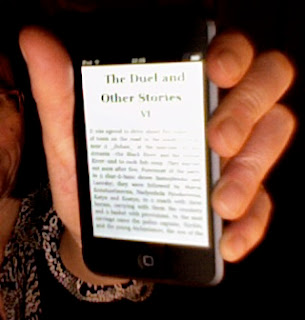Sunday Salon: The Siege of Krishnapur by J G Farrell
 It is 1857, and the Collector in Krishnapur knows there is something wrong. He keeps finding chapatis in strange places, and there are general rumours of unrest in the native troops. When he starts making earth defences around the little British settlement he is generally ridiculed and thought eccentric, but of course he gets the last laugh.
It is 1857, and the Collector in Krishnapur knows there is something wrong. He keeps finding chapatis in strange places, and there are general rumours of unrest in the native troops. When he starts making earth defences around the little British settlement he is generally ridiculed and thought eccentric, but of course he gets the last laugh.'Laugh' is not an inappropriate term for much that follows. Despite the horror, The Siege of Krishnapur is a funny book - this is due to the nuances of the extremely well-observed characters. Despite worsening conditions they behave very much as they have always behaved, not exactly ignoring what is going on around them, but maintaining a certain decorum. 'Civilisation', in particular British civilisation, is the guiding principal for all their lives and it is this, I realise on the very last page is what the book is all about. What is civilisation - and is it worth maintaining?
Krishnapur is a piece of upper class England in India. The Collector's mansion is filled with the paraphenalia of home, and J G Farrell describes the claustrophobic Victorian clutter with an eye for detail. There are books and exquisite pieces of furniture, glass cabinets of stuffed animals, and many items gleaned by the collector from the famous 1851 world fair held in Crystal Palace in London. However, each one is already being ravaged by the Indian climate: the stuffed animals are partly decayed and the books half eaten, and all the furniture has to stand in their own moats of water to prevent invasion by insects. Even at the start it is clear that this 'civilisation' is a temporary visitor - but the collector has an unquestioning faith in it: through civilisation, he thinks, there is scientific discovery and innovation, and in this England is the undoubted leader. It is an act of munificence to share these trappings with the rest of the world, but the Indians don't seem to be particularly grateful.
As with all great books, there are timeless resonances, and this one seems particularly prophetic. For instance toward the end of the book, things have got so bad most of the settlement have decided to auction caches of food that belonged to people who have died and a servant called Vokins makes a bid for some ham. But then the Collector intervenes:
'And look here man, how d'you think you're going to pay for it all? You haven't a penny to your name.'Which is, I believe, the origin of the current economic crisis in a nutshell. Given that the book was published in 1973 it seems prescient.
Again Vokins mumbled. 'Speak up, man!'
'It's not for me, sir.'
'Then who is it for?'
'It's for Mr Rayne, sir.'
All eyes turned toward Rayne, who smiled apologetically and said, yes , that he had Vokins to bid on his behalf as he himself would be conducting the auction and it would clearly be difficult for him to put in bids and be auctioneer at the same time.
'Who else has been making bids for Mr Rayne?' A number of gentlemen raised their hands uncertainly, and a gasp of surprise went up from the assembly as it became evident that almost all the food had been bought on Rayne's behalf.
'D'you have enough money to pay for all these goods, Mr Rayne?'
'Not at the moment, sir, but I soon will have.'
'You intend to sell them again?'
'Most of them, yes...There should be no difficulty....unless, of course.' Rayne added with a smile, 'the relief comes sooner than expected.'
'Mr Rayne, d'you consider it honourable to profit from the distress of your comrades...of the men, women and children with whom you are fighting for your life?'
'It's a question of fortune, Mr Hopkins. One has to make the best of a situation, after all. Besides, everyone else is bidding out of their next pay, just as I am. They can bid against me if they are prepared to risk it. '
'Is everyone bidding out of future pay?'
Several gentlemen nodded and someone said: 'Nobody has cash, of course. That was the only way to do it.'
It's taken me at least two months to read this book. I would read just a little at each sitting and be content with that. I found it was something I could leave and pick up and be instantly back in Krishnapur because the writing made such a vivid impression it was burnt into my memory. Towards the end the momentum picked up and I read late into the night. Anyway, it was a great book, and made me think of other good books I've read on being beseiged: Helen Dunmore's THE SIEGE, Albert Camus's THE PLAGUE and Ann Patchett's BEL CANTO. Each of these books were entirely different from each other in style and what they had to say. 'SiegeLit' seems to be a genre with much potential.
















